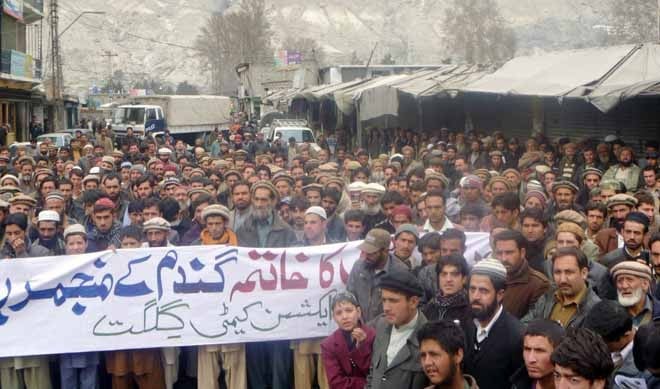

Last month, the people of Gilgit Baltistan raised great hue and cry after the government revised the wheat price from Rs8 to Rs14 per kilogramme. To press the government to reverse the decision, an action committee was formed, consisting of religio-political parties, nationalists and ultra nationalists. However, the two mainstream national parties; the PPP that is ruling GB and the PML-N at the centre, were not part of this movement.
The action committee staged a public rally and sit-in (dharna) on April 15 in all districts in favour of their demands that consisted of nine points including wheat subsidy. Thousands of people participated in the sit-in that lasted 11 days and concluded with the acceptance of the demand to reduce price of wheat by Rs3 per kg on April 26.
There is strong resentment in the government circles and public about black marketing of wheat in huge quantity. Black marketing started from Passco godown. Mirza Husain, Chairman Standing Committee on Food in GB Legislative Assembly, says that 300,000 wheat bags (100 kg each) are sold in black market with the connivance of the provincial food ministry. Black marketers make Rs1,500 per bag which comes to Rs450,000,000 in total. The Mafia is getting Rs3 subsidy per kg which makes Rs300 subsidy on a bag of 100kg.
Action committee convener Ehsan Ali Advocate says NAB must register a case against the culprits. Ehsan says that the PPP and the PML-N misled the people on the subsidy issue, portraying that subsidy was only on carriage and not on wheat cost which amounted to deceiving their own people.
He categorically blames the food ministry for corruption and black marketing of wheat.
Ehsan says now the action committee will work towards devising a strong mechanism to prevent black marketing.
The government has accepted three demands out of nine which apart from subsidy on wheat, is on issue of gem stones and waiving off hospital fees across GB.
A notification in this regard was not issued till the filing of the story and a lot of ambiguity exists about the increase in wheat price in future. Chief Minister Gilgit Baltistan, Syed Mehdi Shah denies allegation of black marketing and firmly says that price of wheat might be increased at any time, and even subsidy might be withdrawn.
Many people are of the view that this is a politically motivated agenda for forthcoming GB legislative assembly election. Time will decide what was behind this well-organised and well-participated gathering that happened for the first time ever in GB after Gilgit city faced sectarian issues.
Even though Gilgit Baltistan (GB) joined Pakistan in November 1947, the status of the area still remains ambiguous. Until recently, GB had no representation in the country’s parliament and other national forums where policies are formulated for the people. Nonetheless, Frontier Crimes Regulation (FCR) was introduced while all political and basic rights were denied.
Following the emergence of democracy in 1972, the then prime minister ZA Bhutto lifted FCR, the draconian law, leading to political activities and civil laws in this mountainous region. The then government, keeping in view the mountainous terrain, less-cultivated land and insufficient food, gave wheat subsidy according to wheat support prices in Punjab. People of GB would get wheat at Rs8 per kg till 2011.
On July 22, 2011 wheat price was revised in a meeting of Economic Coordination Committee. The new price was fixed at Rs14 per kg.